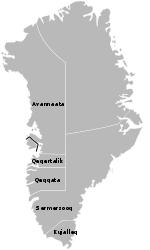Narsaq Kujalleq
Geography
Narsarmijit is the southernmost settlement in the country, located approximately 50 kilometers (31 mi) north of Cape Farewell, the southern cape of Greenland.
History
The city is located in the area of the easternmost of the Norse settlements during their colonization of Greenland. The former village of Ikigait is roughly 3 kilometers (1.9 mi) away and was the site of Herjólfr Bárðarson's farm Herjolfsnes ("Herjolf's Point").
The Moravian missionary Conrad Kleinschmidt (1768–1832) founded the station of Friedrichsthal (Danish: Frederiksdal, lit. "Frederick's Valley") in 1824. The name honored Frederick VI of Denmark. The station was the Moravian's fourth, after Neu-Herrnhut (1733), Lichtenfels (1748), and Lichtenau (1774) and before Umanak (1861) and Idlorpait (1864). All the Greenland missions were surrendered to the Lutheran church in 1900. In the 19th century, the area served as a prime territory for sealing. Members of the settlement rescued the survivors of the ill-fated German polar expedition's Hansa in 1870. In 1906, pastor Jens Chemnitz founded Greenland's first sheep farm in Narsarmijit; the industry has since moved north to the larger pastures around Narsaq.
Until 31 December 2008 the settlement belonged to the Nanortalik municipality. Since the administrative reform enacted on 1 January 2009 the settlement has been part of Kujalleq.
Transport
The village is served by the Narsarmijit Heliport. Air Greenland district helicopters link the settlement with Nanortalik, and further to Qaqortoq and Narsarsuaq.
Population
Most towns and settlements in southern Greenland exhibit negative growth patterns over the last two decades, with many settlements rapidly depopulating. The population of Narsarmijit has decreased nearly a half relative to the 1990 levels, by nearly a quarter relative to the 2000 levels.
References
- ^ Sabine, Edward (1872). "Contributions to Terrestrial Magnetism. No. XIII". Philosophical Transactions of the Royal Society of London. 162: 353–433. ISSN 0261-0523.
- ^ Kujalleq Municipality Archived 2011-07-21 at the Wayback Machine (in Danish)
- ^ The name is from the local dialect of Greenlandic. The standard Kalaallisut name Narsaq Kujalleq was used briefly. Their pre-1973 spellings were Narsamiit and Narssak Kujatdlek or Narsak. In both dialects, the name means "Dwellers from the Plains".
- ^ Jensen, Einar Lund & al. Monographs on Greenland: Man & Society: Cultural Encounters at Cape Farewell: The East Greenland Immigrants and the German Moravian Mission in the 19th Century. Museum Tusculanum Press, 2011. ISBN 87-635-3165-8.
- ^ "Population by place of birth, locality and time (primo)". Statistics Greenland. Retrieved 11 January 2025.
- ^ O'Carroll, Etain & al. Greenland and the Arctic. Lonely Planet, 2005. ISBN 1-74059-095-3.
- ^ Fiske, John. The Discovery of America, Vol. 1. Echo Library, 2009. ISBN 1-4068-2929-3.
- ^ Scott, Brian M. Place-Names in the Landnámabók Archived 2012-03-24 at the Wayback Machine". Accessed 28 Apr 2012.
- ^ Del, Anden. "Grønland som del af den bibelske fortælling – en 1700-tals studie Archived 2012-07-15 at the Wayback Machine" ["Greenland as Part of the Biblical Narrative – a Study of the 18th-Century"]. (in Danish)
- ^ Lüdecke, Cornelia. "East Meets West: Meteorological observations of the Moravians in Greenland and Labrador since the 18th century Archived 2016-03-03 at the Wayback Machine". History of Meteorology 2 (2005). Accessed 27 Apr 2012.
- ^ Kent, Kane Elisha. Arctic Explorations.
- ^ "The 1869/70 German North Polar Expedition".
- ^ "Booking system". Air Greenland. Archived from the original on 22 April 2010. Retrieved 6 July 2010.
- ^ Statistics Greenland Archived 2011-08-12 at the Wayback Machine

